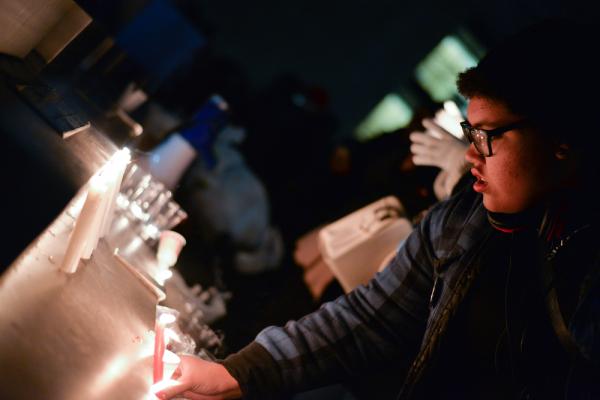What can local churches do to support ongoing protests against, and indeed upheaval of, an unjust criminal justice system and deep-seated white supremacy? In a season that Lisa Sharon Harper recently described as “Advent as protest,” what might it mean for Christians to anticipate the coming of Christ by physically challenging oppression? For pastors all over the United States, these are the questions of the moment.
In Washington, D.C., local faith communities sought to live into the vision of Advent as protest by holding a “vigil for justice.” Although this vigil beautifully documented the capacity of the local church to advocate for justice, the way local media framed the vigil forces communities of faith to think more deeply about their understanding of solidarity.
Spread out along nearly 6.5 miles of 16th Street, hundreds of people held candles and signs in support of recent protests against racial injustice. As people passionately waved their signs or held their heads down in prayerful lament, passing cars and buses slowed to honk in support. Catching on with the theme of Advent, attendees hoped to shine light in the darkness not only to create awareness and show solidarity, but also to testify to the hope of faith.
Cecilia Choi, a member of District Church explained, “This is the time of Advent when God came and he started his work of reconciliation with us by becoming one of us. And I think it’s perfect to come out and work on reconciliation and joining with our black brothers and sisters. They’re not just our neighbors, they’re our brothers and sisters in Christ. We have such an obligation to them. I think this is an act of worship.”
When asked why she was on the streets, one woman responded, “Well, what do I say? [Laughs.] That’s the meaning of our faith! To be one with people who are suffering.” Another man called racism “the deepest sin in the United States.”
Such descriptions of the vigil reach to the core of the church’s mission to “do justice, love mercy, and walk humbly.” Here are churches standing in solidarity with those suffering at the hands of racist oppression as an “act of worship.” Here are churches bringing their resources of prayer, lament, and peace into the public sphere, challenging observers to wrestle with God’s call to justice. Yet, though the event was beautiful, the way it was framed by local media raises tough questions for churches. Contrasting this demonstration with other recent protests, one reporter said, “This protest was in contrast to many of the protests we’ve seen over the past few weeks, with groups blocking traffic and loudly chanting. This group was quiet and purposeful.”
Read the Full Article

